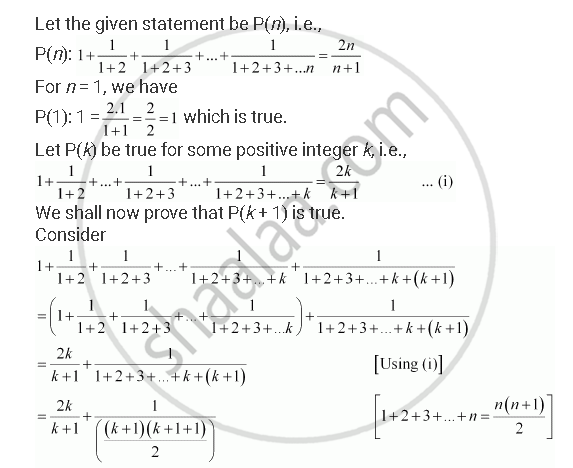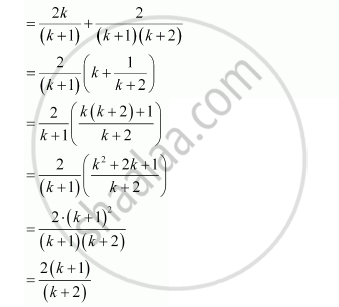Advertisements
Advertisements
Question
Prove the following by using the principle of mathematical induction for all n ∈ N:
Solution


Thus, P(k + 1) is true whenever P(k) is true.
Hence, by the principle of mathematical induction, statement P(n) is true for all natural numbers i.e., n.
APPEARS IN
RELATED QUESTIONS
Prove the following by using the principle of mathematical induction for all n ∈ N:
`1 + 3 + 3^2 + ... + 3^(n – 1) =((3^n -1))/2`
Prove the following by using the principle of mathematical induction for all n ∈ N: 1.2.3 + 2.3.4 + … + n(n + 1) (n + 2) = `(n(n+1)(n+2)(n+3))/(4(n+3))`
Prove the following by using the principle of mathematical induction for all n ∈ N:
`(1+ 1/1)(1+ 1/2)(1+ 1/3)...(1+ 1/n) = (n + 1)`
Prove the following by using the principle of mathematical induction for all n ∈ N: n (n + 1) (n + 5) is a multiple of 3.
Prove the following by using the principle of mathematical induction for all n ∈ N: 102n – 1 + 1 is divisible by 11
Prove the following by using the principle of mathematical induction for all n ∈ N: 32n + 2 – 8n– 9 is divisible by 8.
Given an example of a statement P (n) such that it is true for all n ∈ N.
12 + 22 + 32 + ... + n2 =\[\frac{n(n + 1)(2n + 1)}{6}\] .
\[\frac{1}{3 . 5} + \frac{1}{5 . 7} + \frac{1}{7 . 9} + . . . + \frac{1}{(2n + 1)(2n + 3)} = \frac{n}{3(2n + 3)}\]
2 + 5 + 8 + 11 + ... + (3n − 1) = \[\frac{1}{2}n(3n + 1)\]
1.2 + 2.3 + 3.4 + ... + n (n + 1) = \[\frac{n(n + 1)(n + 2)}{3}\]
\[\text{ Given } a_1 = \frac{1}{2}\left( a_0 + \frac{A}{a_0} \right), a_2 = \frac{1}{2}\left( a_1 + \frac{A}{a_1} \right) \text{ and } a_{n + 1} = \frac{1}{2}\left( a_n + \frac{A}{a_n} \right) \text{ for } n \geq 2, \text{ where } a > 0, A > 0 . \]
\[\text{ Prove that } \frac{a_n - \sqrt{A}}{a_n + \sqrt{A}} = \left( \frac{a_1 - \sqrt{A}}{a_1 + \sqrt{A}} \right) 2^{n - 1} .\]
\[\text{ A sequence } a_1 , a_2 , a_3 , . . . \text{ is defined by letting } a_1 = 3 \text{ and } a_k = 7 a_{k - 1} \text{ for all natural numbers } k \geq 2 . \text{ Show that } a_n = 3 \cdot 7^{n - 1} \text{ for all } n \in N .\]
\[\text { A sequence } x_1 , x_2 , x_3 , . . . \text{ is defined by letting } x_1 = 2 \text{ and } x_k = \frac{x_{k - 1}}{k} \text{ for all natural numbers } k, k \geq 2 . \text{ Show that } x_n = \frac{2}{n!} \text{ for all } n \in N .\]
Prove by method of induction, for all n ∈ N:
2 + 4 + 6 + ..... + 2n = n (n+1)
Prove by method of induction, for all n ∈ N:
3 + 7 + 11 + ..... + to n terms = n(2n+1)
Prove by method of induction, for all n ∈ N:
`1/(1.3) + 1/(3.5) + 1/(5.7) + ... + 1/((2"n" - 1)(2"n" + 1)) = "n"/(2"n" + 1)`
Prove by method of induction, for all n ∈ N:
(23n − 1) is divisible by 7
Prove by method of induction, for all n ∈ N:
3n − 2n − 1 is divisible by 4
Prove by method of induction, for all n ∈ N:
5 + 52 + 53 + .... + 5n = `5/4(5^"n" - 1)`
Prove by method of induction, for all n ∈ N:
(cos θ + i sin θ)n = cos (nθ) + i sin (nθ)
Prove by method of induction, for all n ∈ N:
Given that tn+1 = 5tn + 4, t1 = 4, prove that tn = 5n − 1
Answer the following:
Given that tn+1 = 5tn − 8, t1 = 3, prove by method of induction that tn = 5n−1 + 2
Answer the following:
Prove by method of induction 52n − 22n is divisible by 3, for all n ∈ N
The distributive law from algebra says that for all real numbers c, a1 and a2, we have c(a1 + a2) = ca1 + ca2.
Use this law and mathematical induction to prove that, for all natural numbers, n ≥ 2, if c, a1, a2, ..., an are any real numbers, then c(a1 + a2 + ... + an) = ca1 + ca2 + ... + can.
Prove the statement by using the Principle of Mathematical Induction:
4n – 1 is divisible by 3, for each natural number n.
Prove the statement by using the Principle of Mathematical Induction:
n(n2 + 5) is divisible by 6, for each natural number n.
Prove the statement by using the Principle of Mathematical Induction:
n2 < 2n for all natural numbers n ≥ 5.
Show that `n^5/5 + n^3/3 + (7n)/15` is a natural number for all n ∈ N.
If 10n + 3.4n+2 + k is divisible by 9 for all n ∈ N, then the least positive integral value of k is ______.
State whether the following statement is true or false. Justify.
Let P(n) be a statement and let P(k) ⇒ P(k + 1), for some natural number k, then P(n) is true for all n ∈ N.
By using principle of mathematical induction for every natural number, (ab)n = ______.
